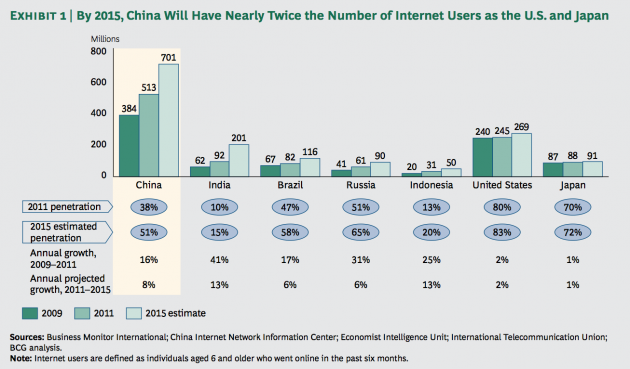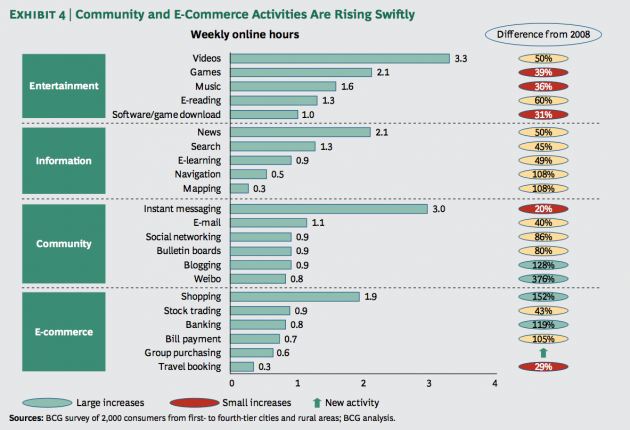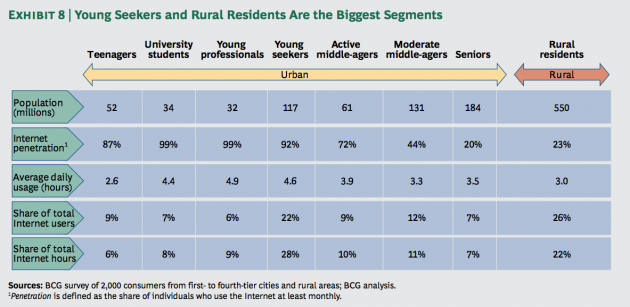China’s Internet Population to Double US and Japan Combined by 2015
So we received a really interesting research report about China digital space from Boston Consulting Group. I have gone through the report several times, and there are many breathtaking numbers. But the charts that caught my attention are the ones below. One of which estimated that by 2015, China will have nearly twice the number of internet users as U.S and Japan combined. The most recent internet user count released from Chinese officials stands at 513+ million users, and that figure is surely higher now. BCG estimated that the figure will break 700 million by 2015. In contrast, Japan and the U.S are estimated to have a combined total of 360 million internet users.
BCG also notes that in 2011, Chinese consumers spent a whopping 1.9 billion hours a day online, an increase of 60 percent from two years earlier. Much of the growth in internet user count will be by fueled by older and rural residents. Internet user count under the “senior Chinese citizen” (over age 51) is estimated to double by 2015 to 81 million.

Young Chinese also trust internet sources more than any other media. And this, to some extent, explains why the Chinese government is so uptight with internet censorship in the country. The last couple of months have provided no shortage of drama: the real-name registration saga, Sina and Tencent Weibo got punished for spreading rumors, and the recent internet blackout in China (which annoying caused our own team some downtime). The reason of the blackout is still unknown despite the many hypotheses that are circulating.
On China’s internet usage, entertainment and social networking (games, music, downloads, weibo, QQ) is still the number one reason why Chinese get sucked into the web. On average a Chinese internet user spends more than three hours consuming online videos. Instant messaging is also at three hours each week. In comparison, an average Chinese user spends just 1.1 hour on email each week. Weibo-ing and social networking activities accounts for 1.7 hours of an average user’s time each week. Weibo has been growing like a weed over the past few years. BCG recorded a 376 percent growth in Weibo usage since 2008 but it remains to be seen how Sina and Tencent will react and recover from the real-name registration requirement set by the government. Right now the rules aren’t strictly followed by both internet giants.
E-commerce also saw a huge leap with a whopping 152 percent growth since 2008. The growth isn’t just from big players like Alibaba Group and 360Buy. Over the course of the year, we’re seeing vertical e-commerce stores like Lamiu, Mbaobao.com, VIPShop, and the hundreds of group-buy sites spurring online purchase in China too. It is also important to note that group-buying is really a competitive business in China and none of the players have claimed to have turned a profit. IPO plans from Meituan, one of the bigger group-buy players was also stalled.

BCG also conveniently segments Chinese internet users in eight different groups. So business development and marketing folks, here is some handy information to make segmenting and targeting a little easier:

In summary, the internet realm in China is huge and still growing. This is, by now, a pretty cliched statement, but there’s really no other way to put it. And everyone, whether they are domestic or international players, wants a piece of the action! We encourage you to click over to BCG's site and check out the report in its entirety to find out more.

 Yahoo Finance
Yahoo Finance 
